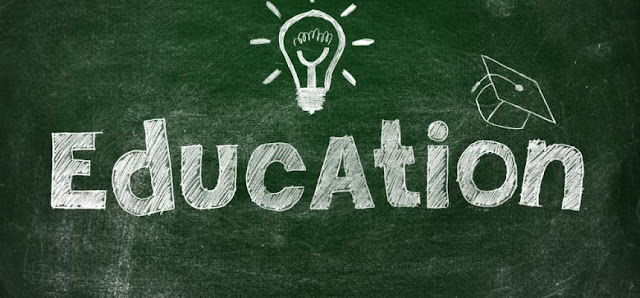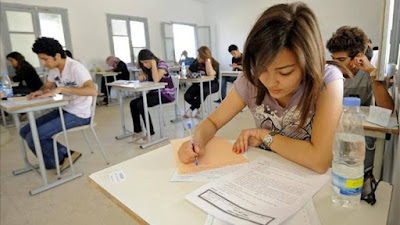“Education is the most powerful weapon which you can use to change the world.”
― Nelson Mandela
This is an
article about the trouble caused by the biggest problem in Tunisia. This
article is about the drawbacks of our Tunisian educational system.
If we come
to think about it, the Tunisian educational system is so flawed that we cannot
talk about all that in one article. We will maybe write more than just one.
Now let us ask
the question “What do you think is wrong with our educational system?”
For such a
question, we will get a myriad of different answers. Some would say that our
programs are flawed and that we should be taught more “useful” things, as in
“Let’s just stop theoreticizing life!”. Some others would say that we seriously
lack extracurricular activities where the abilities and potential of students
can be discovered, explored and improved. Some would even say “we don’t even
know what is really wrong or who should be blamed for all of this.”
In this
article we’ll just try to talk about the main drawbacks of our educational
system for, as we said, one article cannot address every single problem.
Let’s start
with the first, and deemed most important, problem; the curricula, or the
teaching programs and materials, right?
In our elementary and basic levels of education, some manuals have been the same for decades now! As far as I can remember, the major change was in 2013 and it had to do with the manuals of civic education (التربية المدنية) as the picture of the former president, Ben Ali, was removed. Huge, right?
English manuals contain lessons that I personally find “absurd”, I mean, why would a Tunisian 18-year-old be interested in learning about space tourism? Does it even exist?
Let us stop here for a little fact. According to statistics from IBM, the human knowledge multiplies every 18 hours. That means, all the knowledge, the information that the human gathers throughout hundreds of years, multiplies every 18 hours. In the meanwhile, our curricula have been “frozen” for years now. We study the same material, in the same way that the generation before us did.
There’s also this problem with language. Since
colonialism, we have been studying in French and this has not changed even if
today, English is more of a worldwide language that almost all countries use to
communicate and do business. In Tunisia, we’re still very far behind in that.
Let’s also not forget to talk about something related to the curricula; everything is just “too much”. We have an average of 14 subjects of study, subjects that supposedly aim at making students “experts” in all the aspects; Literature, History, Science, Philosophy, Languages, Computers and so on and so forth. This unfortunately does not turn out as it is supposed to be and we sadly have students that are “good at nothing”. According to statistics and numbers of the PISA test, we have some of the weakest scores in reading, science and mathematics because we basically have a huge amount of information, in little time with no logical relations between one subject and the other.
In this case, the student ends up studying everything
but then, everything is a total unrelated mess in one’s mind. This is also what
causes much frustration.
We
also do not know why we are studying this much and how are we going to use what
we study and apply it in real life. We come to realize that in order to make it
through our education, we only need to study and memorize things that we do not
necessarily understand or can use in real life.
This takes us to the conclusion that our curricula are old, outdated,
based on the French language, and most of all depends on a heavy flow of
information.
Isn’t it sad that we only study and
« retain » things only to use them on the day of the exam, but once
the exam is over we rarely remember anything of that ?
The third major problem is something not any less
important : Time !
This has been a very problematic issue lately. It has been
discussed by the ministry, the teachers, and the syndicates. All of those were
gathered to find a solution ; from a trimester, we shifted towards a
semester. We no longer have a « semaine bloquée » in basic and
secondary education and many other changes. We honestly have the feeling that
those are just experiments rather than serious attempts to solve the problems.
This problem is not exclusive to students, teachers also suffer from it.
Let’s be clear about it. This is not an easy issue.
In Tunisia, the holidays of the secondary education have to be the same as
those of the higher education. Some people even think that we have so many
unnecessary breaks. Some others think that three months for summer holidays are
too long which makes the rest of the year too hectic. We also do have plenty of
study hours per day (6 to 8) because, as some argue , is due to the fact that we have only 5 days of school per week.
This is of course not an excuse to have an over-packed timetable.
The fourth problem is our exam system :
Our exams are basically an evaluation of how much information we
could memorize. It does not take into account our creativity or critical
thinking abilities. It might only help you improve your maths or, sometimes,
language skills (because we study those intensively).
However, there is more than that to intelligence. We can actually
talk about more than 9 types of intelligence, including bodily, spatial, naturalist, musical, and interpersonal intelligences.
Those are types of intelligences our system does not even consider, let alone
work on.
Coming now to one of the major problems we have in our examination
system :the BAC exam.
The Tunisian BAC, or how to make a student’s whole academic future
depend on a one-week exam. This year is what Tunisian students fear most,
mainly because of the family and society’s pressure that is put on them.
Our examination systems should be reviewed and there should be ways to test the real potential of students. Exams should be fair to all types of intelligences, not just a pen and paper « write what you memorized » kind of exams.
Our examination systems should be reviewed and there should be ways to test the real potential of students. Exams should be fair to all types of intelligences, not just a pen and paper « write what you memorized » kind of exams.
As we reach our conclusion, you have probably noticed how many problems our educational system has. Of course, we cannot talk about all of those in one article. Many other problems might have come to your mind while reading this. We then have to also talk about the solutions we suggest to improve our educational system for our purpose here is not to only complain and analyse our problems.
All in all, we think that there’s a major problem of mentality in
our society that led our education to where it is now. I mean, think of the
times you have seen a politician seriously talking about education,
rarely ? Right ?
**This article is the transcript of a Tunisian YouTube video.
The video is one of a series of video that aim at voicing up the Tunisian
students’ problems, discuss and solve them.
**We want to thank the Tunisian youtuber "Yasser Machat" for
taking the time to tackle one of the most critical issues we are facing as
Tunisian youth and for accepting to collaborate with us in this topic.
The video on which the article is based from here!
The YouTube channel to which you should subscribe for more on
education in Tunisia from here !
Sinda Arfaoui





























COMMENTS